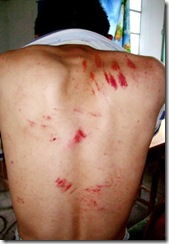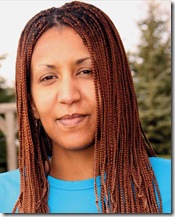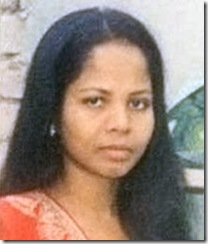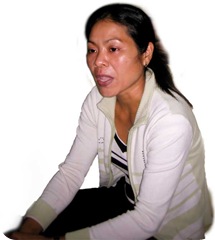Consider the outcome of their way of life, and imitate their faith. 
Hebrews 13:7b (ESV)
September 20, 1565: Spanish sea captain Menendez brutally wipes out French Huguenots in Florida.
September 20, 2005: On September 20, a German national living in the Hadramawt region of Yemen has his house set on fire and his car bombed because he has been accused of "promoting Christianity."
September 21, 1522: First edition of Martin Luther's German translation of the New Testament is published.
September 21, 1558: Charles V, Holy Roman Emperor, dies. Charles called the Diet of Worms in 1521, which condemned Martin Luther.
September 21, 1992: Two Islamists from the group Abu Sayyaf enter the studios of the Christian radio station DXAS in Zamboanga, Philippines armed with handguns and open fire. After the shooting stopped, three people lay dead; Christian pastor-broadcaster Greg Happala, radio technician Greg Bacabis, a control operator, was also dead, and a Ambri Asari, a local fisherman who had stopped by to deliver a public service announcement.

September 21, 2005: An Iranian Christian couple are arrested. For the next two years they are harassed by authorities. Then in September 2007, they were whipped in their home because they refused to stop attending house church meetings.
Spetmber 21, 2005: Sardauna Anaruwa Sashi, a convert to Christ from Islam, is arrested by police in Paiko, Nigeria and severely tortured. He claims that at one point police beat him with their batons and almost killed him. It was only through the intervention of his pastor and a lawyer from his church that he was released.
September 22, 286: Emperor Maximian orders the execution of the entire Theban Legion (consisting of six thousand six hundred and sixty-six men, all of them Christians) when they refuse to deny their faith.
September 22, 1557: John Noyes, a shoemaker, of Laxfield, Suffolk, England is led to the stake to be burned. He kneels down, prays, and recites Psalm 50. As he was chained to the stake, he said, "Fear not them that kill the body, but fear him that can kill both body and soul, and cast it into everlasting fire!" And as he was burned by the flames, his final words were, "Lord, have mercy on me! Christ, have mercy upon me!"
September 22, 1734: The Confessors of the Glory of Christ, followers of 16th century Polish reformer Caspar Schwenckfeld, settle in the Pennsylvania Dutch countryside. In 1525 Schwenckfeld had traveled to Wittenberg to ask Martin Luther for an appointment, but found they disagreed on many issues. He became part of the Radical Reformation and Catholics and Protestants both persecuted him.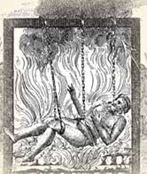
September 23, 1413: John Oldcastle is brought to trial for heresy before Archbishop Arundel where he presented his confession of faith. A few days later, he was condemned but because of his friendship with the king was allowed 40 days to recent. He escaped and went into hiding. When captured four years later, he was hanged briefly and then suspended in iron chains over a fire and roasted to death.
September 23, 1557: Twenty-two year old Cicely Ormes is brought to the stake at eight o'clock in the morning. After declaring her faith to the people, she laid her hand on the stake, and said, "Welcome, thou cross of Christ." Her hand was sooted in doing this, (for it was the same stake at which Miller and Cooper were burnt,) and she at first wiped it; but directly after again welcomed and embraced it as the "sweet cross of Christ." After the tormentors had kindled the fire, she said, "My soul doth magnify the Lord, and my spirit doth rejoice in God my Saviour." Then crossing her hands upon her breast, and looking upwards with the utmost serenity, she stood the fiery furnace. Her hands continued gradually to rise until the sinews were dried, and then they fell. She uttered no sigh of pain, but yielded her life, an emblem of that celestial paradise in which is the presence of God, blessed forever.
September 23, 1635: Ulrich Schneider is imprisoned in the famous dungeon of Othenbach in Zurich for his faith. There we was severely mistreated and pressured to renounce his faith until he finally died, without having been weakened in his faith
September 23, 1639: Stephen Zehender, a member of the church at Knonow, is brought in chains to a convent prison in Zurich where he is stripped naked, kept in chains, starved until he finally dies in misery sixteen weeks later.
September 23, 2008: A mob of approximately 60 people led by a Buddhist monk and a local politician set fire to a partially constructed church hall belonging to the Prayer Tower Church in Mailankulama, Puttlam district, Sri Lanka. Several Christians who tried to intervene in the attack were assaulted. Police officers were eventually able to disperse the mob. However, around midnight some of the attackers threatened to kill Christian children if they attended school the next day. Another church member who had tried to protect the building was also threatened with death by the militants.
 September 23, 2008: Mansuur Mohammed (25), a humanitarian aid worker who converted from Islam to Christianity in 2005, is beheaded in Manyafulka village by Islamists chanting "Allahu Akbar" and who cheer while holding up his severed head in front of the horrified crowd. A video of the murder was later circulated in Somalia and in neighbouring countries in what many see as an effort to instill fear in those contemplating converting from Islam to Christianity.
September 23, 2008: Mansuur Mohammed (25), a humanitarian aid worker who converted from Islam to Christianity in 2005, is beheaded in Manyafulka village by Islamists chanting "Allahu Akbar" and who cheer while holding up his severed head in front of the horrified crowd. A video of the murder was later circulated in Somalia and in neighbouring countries in what many see as an effort to instill fear in those contemplating converting from Islam to Christianity.
September 24, 1794: Russian Orthodox priest-monk Father Juvenaly, his brother Stephen, and eight other monks arrive at Kodiak Island, Alaska. After two years of ministry, the team had led 12,000 Alaskans to embrace the gospel. Juvenaly then extended his mission to the mainland, where he was reportedly martyred in 1796.
September 25, 1550: Philip II, King of Spain renews the decrees of Emperor Charles V forbidding Anabaptist doctrine in his realm and ordering severe punishment to anyone caught holding or propagating this “heresy.”
September 25, 1789: Congress amends The U.S. Constitution to prohibit establishment of a state church or governmental interference with the free exercise of religion.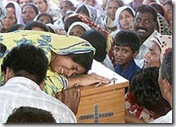
September 25, 2002: Islamist gunmen burst into the offices of the Institute for Peace and Justice in Karachi, Pakistan binding and then shooting seven people in an execution-style attack. Only one witness remained alive, a worker at the centre named Robin Piranditta, who was beaten by the attackers but lived.
 September 25, 2004: Nine missionaries working with a Catholic order known for their work with those most desperately in need in India were attacked and injured by Hindu nationalists. The attacks began as two missionaries visited a slum area on the outskirts of Kozhikode. They were dragged from their jeep and the crosses around their necks were broken. They managed to escape and took refuge in a police station after the people living in the slum intervened on their behalf. An hour later, as the Mother Superior and six others arrived in a jeep to assist those attacked, they were likewise surrounded by a group of around forty, wielding iron rods. Shouting "Long Live BJP," "Long Live the RSS" and other pro-Hindu nationalist slogans, the mob assaulted the missionaries.
September 25, 2004: Nine missionaries working with a Catholic order known for their work with those most desperately in need in India were attacked and injured by Hindu nationalists. The attacks began as two missionaries visited a slum area on the outskirts of Kozhikode. They were dragged from their jeep and the crosses around their necks were broken. They managed to escape and took refuge in a police station after the people living in the slum intervened on their behalf. An hour later, as the Mother Superior and six others arrived in a jeep to assist those attacked, they were likewise surrounded by a group of around forty, wielding iron rods. Shouting "Long Live BJP," "Long Live the RSS" and other pro-Hindu nationalist slogans, the mob assaulted the missionaries.
September 26: Recognized by Roman Catholics in Canada as a feast day recognizing eight Jesuit missionaries who were killed, often after brutal torture, during the wars between the Huron and Iroquois. Because many Hurons had converted through their ministry, the Iroquois considered them legitimate targets, seeing them as allies of their Huron enemies.
(sources: Christianity Today, Glimpses of Church History, The Voice of the Martyrs, Foxe’s Book of Martyrs, Martyrs Mirror, www.abbamoses.com)
Prayer: “Grant that we, who now remember these before thee, may likewise so bear witness unto thee in this world, that we may receive with them the crown of glory that fadeth not away; through Jesus Christ our Lord, who with thee and the Holy Spirit liveth and reigneth, one God, for ever and ever. Amen.” – taken from The Book of Common Prayer, Canada (1962)

+061.jpg)
+082.jpg) Death threats forced Puspanjali and her daughter to flee Kandhamal. Puspanjali is currently living with her parents in another district in the state while Mona Lisa is residing in a Christian hostel. Puspanjali is from a Hindu family, and while her relationship with her parents is good, they pressure her to recant her Christian faith and return to Hinduism. She refuses to deny Jesus, but it is difficult for her to be without Christian community.
Death threats forced Puspanjali and her daughter to flee Kandhamal. Puspanjali is currently living with her parents in another district in the state while Mona Lisa is residing in a Christian hostel. Puspanjali is from a Hindu family, and while her relationship with her parents is good, they pressure her to recant her Christian faith and return to Hinduism. She refuses to deny Jesus, but it is difficult for her to be without Christian community.  accomplice on the way to a church service.
accomplice on the way to a church service.
